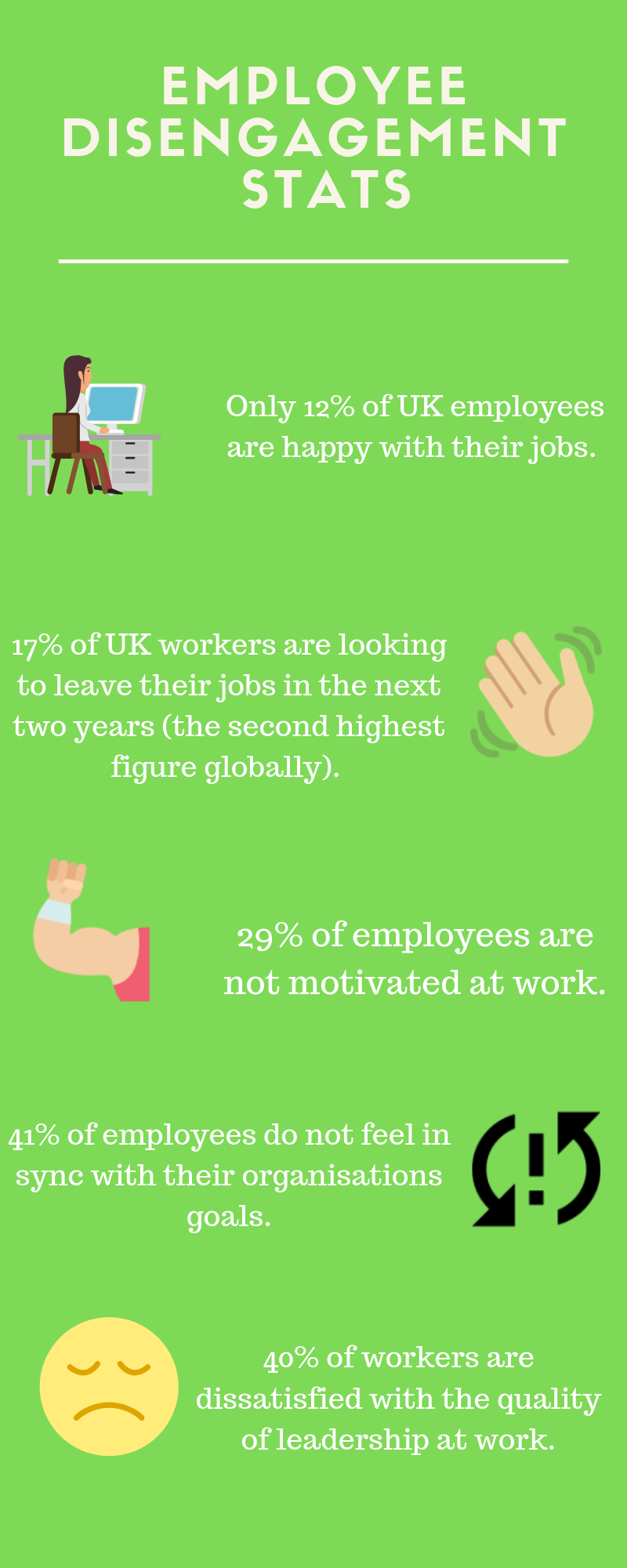What is employee engagement?
Employee engagement relates to the level of commitment, passion and care an
employee feels about the work they do.
employee feels about the work they do.
According to Gallup, there are three basic levels of employee engagement: engaged, not
engaged (disengaged) and actively disengaged.
engaged (disengaged) and actively disengaged.
Research shows that only 39% UK workers are engaged. The remaining 61% are either
disengaged or actively disengaged (Source: Perkbox)
But what does this mean?
Engaged employees
These employees enjoy their jobs and look forward to going to work. They care and will
go above and beyond when contributing to common objectives.
go above and beyond when contributing to common objectives.
They are also loyal to the organisations they work for and and feel personally invested in
the success of those organisations.
Disengaged employees
These employees don’t enjoy their job or look forward to going to work.
They don’t feel connected to the organisation and they think their employers know
nothing about them or their co-workers.
They often don’t feel challenged by the work they do and, though they put in the time,
they lack energy and enthusiasm. This may show in the quantity and quality of their
work, but not in every case.
In reality, employees who are not engaged can be difficult to identify. They may be
performing well and achieving their goals, but through personal pride rather than
because they feel engaged.
Actively disengaged employees
These employees pose a threat. Not only is their productivity low and the quality of
their work poor, but they actively work against the organisation.
their work poor, but they actively work against the organisation.
At work, they’re easily distracted and waste time. They might be prone to poor timekeeping, taking too many breaks or frequent absenteeism.
They often complain constantly, which disrupts and demotivates those around them.
Worse still, they could be undermining, or even sabotaging, their co-workers or the
organisation.
Why employee engagement is important
Employee engagement is important for the employee, their co-workers and the
organisation as a whole.
organisation as a whole.
Engaged employees tend to:
- Be happier at work
- Form better working relationships
- Be more productive and conscientious
- Be enthusiastic and motivate their co-workers.
- Progressive employers understand the role of engagement and are aware of its benefits.
What causes an employee to become disengaged
An employee doesn't wake up one morning and decide to stop caring. It is a gradual process that happens over time. These are some of the factors that could lead to an employee becoming disengaged:
- No career progression and trapped in a repetitive routine
- Minimal communication between either staff members or managers
- Poor work/life balance
- No recognition for the work they do
- Inadequate salary
- Little emphasis on training or acquiring new skills
- No effort is made to implement a company's values in a company
- Useful existing skill-sets are not given the opportunity to be utilised
- Dismissive or disrespectful attitude from management
- Little to no room for personal support
- Prospect of potential losing their jobs (due to layoff or change) can make them unable to care
The benefits of employee engagement for employers
Statistics show that when employees are engaged:
- 87% are less likely to leave
- 37% fewer sick days are taken
- There is a 45% increase in productivity
However, in the UK:
- 23% of UK employees are currently looking for a new job
- £340 billion are lost every year due to employee disengagement
- £13.6 billion are lost due to absenteeism
Employee Disengagement by Statistics

These statistics show that employee engagement is still a challenge for many UK
employers, resulting in higher employee turnover, low productivity and increased costs.
employers, resulting in higher employee turnover, low productivity and increased costs.

Download Your Guide Here!
Learn more about employee engagement, the 'employee experience' and how internal communications can impact both for the better.


